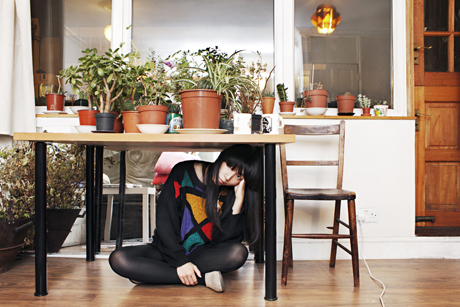Interview: filmmakers Noriko Okaku and Robin Mahoney

Noriko Okaku. Photograph: Miki Takahira
A few days after the close of the Hackney Film Festival last month, I caught up with with two filmmakers who had featured in the festival lineup: graphics-savvy Noriko Okaku, the mastermind behind the drawn live animation /\/\/\, and Robin Mahoney, who had presented We Made Our Own Disaster to the live electronic beats of the internationally renowned DJ Si Begg.
The outcome of their collaboration was a 66-minute mix of archive imagery coupled with improvised sound touching upon the theme of public opinion manipulation and social control.
At first sight, it seemed that the two artists do not share more than the first letter of their post code. However, scratching slightly beneath the surface, one similarity surges: they both arrived in the East End from the Far East. Whilst Noriko Okaku was born and raised in Japan, Robin Mahoney grew up in Hong Kong. It was in their early twenties that they both unpacked their luggage in London before setting off for an entirely distinct artistic journey.
Robin first moved to Ball’s Pond Road in 1987. Thoughtful, but not necessarily nostalgic, he recalls how at that time “nobody wanted to live here: Hackney was the darkest, most avoided place”. I leaned forward to hear him relate stories of an area once populated by squatters, travellers and anarchists, all attracted by the immense number of empty houses: “There was a lot of free thinking, and it was multicultural, something I am keen on.”
Noriko, on the other hand, settled down in the borough only two years ago to witness an artistically blooming space. She explains: “I had attended university in the West End. After my graduation I went back to Tokyo, where I worked so much for an advertising company that I was unable to carry on my artistic projects. So, after three years I came back to London, and I ended up in Old Street.”
When asked specifically about her relationship with Hackney, she puts on an embarrassed smile before replying “I always stay home. I have to be in front of the computer all day”. She then reveals that her source of inspiration has nothing to do with the extravaganza of her geographical surroundings. Blessed with a vivid imagination, she is able to visualise images out of “a phone conversation with a friend for example. Then I try to put what I thought into an animation”.
On the face of it, the two artists have totally different styles, However, a closer inspection suggests similarities. For instance, Noriko proposed an animation with an abstract story, delicately told through a harmonic flux of colours and representations. There is a plot, but it “remains deliberately vague. I like the idea of leaving the audience free to interpret in its own way, up to the point of finding completely unrelated meanings from the original one.”
On a similar note, We Made Our Own Disaster is less interested in conveying a message than one might think from its subtitle, A History of Fascism in the 20th Century. As Robin says: “We don’t try to push any political agenda; we are just sort of exploring why people create stuff to influence people’s opinion”.
Commenting on making an abstract film, Robin added: “I love the idea of music being a complete abstract form of art. Unlike anything else, it brings feeling and emotion without forcing them down your throat. You can do it with pictures as well and try to avoid the attraction of pushing an idea across.”
In this sense, his film can be understood as an audiovisual album and an attempt “to entertain by ripping off movies, just in order to produce an alternative form of 15 minutes of oddness.”
If you missed the performances, you might be disappointed to know that your corner film rental shop will not have them on the shelf. It is not all bad news though. You will be able to catch her at one of London’s upcoming audiovisual festivals. Robin, however, rarely jumps on stage for such performances. He regards such events as “a nice departure from what I usually deal with, which is narrative cinema”.
Before waving me goodbye, he slipped in a little remark on his next film: “At the moment, with Mensch Film [his production company], we are about to promote the remake of one of our old documentaries from the ‘90s: Glastonbury the Movie. When it came out, Mike Leigh called it a masterpiece. Hopefully we will get his opinion again on this last version, which I believe is way better.”
Related:
